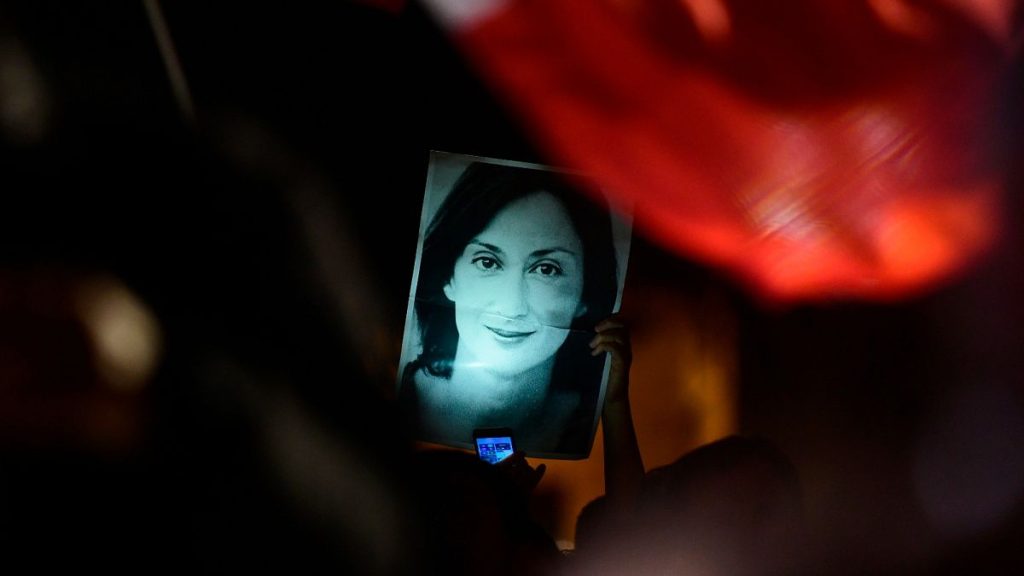A jury in Malta successfully convicted two men, Jamie Vella and Robert Agius, for their roles in the murder of investigative journalist Daphne Caruana Galizia. The verdict came at the conclusion of a six-week trial, which also examined another homicide. Caruana Galizia, known for her rigorous scrutiny of alleged corruption among political elites in Malta, was killed by a car bomb in 2017, an event that stirred protests and calls for justice. Despite the verdict, her family remarked on the persistent institutional failures that allowed her murder to occur without adequate reform.
| Article Subheadings |
|---|
| 1) Background of Daphne Caruana Galizia’s Investigation |
| 2) Details of the Trial and Verdict |
| 3) Implications of the Verdict for Malta |
| 4) Reactions from the Family and Public |
| 5) Other Relevant Proceedings |
Background of Daphne Caruana Galizia’s Investigation
Daphne Caruana Galizia was a renowned journalist in Malta, highly regarded for her fearless investigations into corruption among political leaders and businesses. Throughout her career, she focused on the repercussions of political power on the lives of ordinary Maltese citizens. Particularly, Caruana Galizia scrutinized the ties between government officials and financial dealings uncovered in the Panama Papers. In her work, she accused high-ranking officials, including individuals associated with then-Prime Minister Joseph Muscat, of operating offshore accounts and engaging in unethical practices. This work not only gained her recognition but also made her a target for powerful entities, culminating in her tragic assassination.
Details of the Trial and Verdict
The trial of Jamie Vella and Robert Agius unfolded over six weeks, with jurors examining extensive evidence related to the murder of Caruana Galizia. The critical aspect of the trial was the connection between the accused and the car bomb that killed the journalist on October 16, 2017. On the last day of the trial, the jury arrived at a unanimous verdict, finding both men guilty of supplying the bomb used in the assassination. Their conviction marks a significant moment in Malta’s ongoing struggles with political corruption and impunity. Pending sentencing, which will occur later, advocates are hopeful this judgment will contribute to broader accountability for those involved in orchestrating Caruana Galizia’s murder.
Implications of the Verdict for Malta
The verdict has broader implications for the Maltese political landscape, highlighting the need for reform. Following Caruana Galizia’s murder, the country faced intense scrutiny from both local and international communities regarding its handling of corruption and justice. The case has become emblematic of the fight against impunity and has sparked significant dialogue about the rule of law in Malta. Activists and journalists are hopeful that this conviction will renew momentum towards comprehensive reforms aimed at fostering a safer environment for investigative journalism and restoring public trust in governmental institutions.
Reactions from the Family and Public
In response to the verdict, Caruana Galizia’s family expressed mixed feelings. They acknowledged the importance of the jury’s decision but emphasized that it does not erase the systemic issues that allowed her murder to happen. In their statement, they noted,
“Eight years after Daphne’s brutal assassination, the institutional failures that enabled her murder remain unaddressed and unreformed.”
The verdict has also incited public protests, with citizens demanding greater accountability from the government and a more robust legal framework to protect journalists. As public interest remains high, calls for justice continue, revealing the deep societal impact of her work and untimely death.
Other Relevant Proceedings
In addition to the current trial, other legal proceedings are connected to the murder of Caruana Galizia. Other individuals, including George Degiorgio and Adrian Agius, previously pleaded guilty to their roles in her murder and received lengthy prison sentences. Yorgen Fenech, a businessman implicated in the conspiracy, is currently awaiting trial on separate charges in connection with the assassination. Moreover, a third suspect, Vincent Muscat, testified during the recent trial under the condition of a presidential pardon for his involvement in a different murder case. This web of legal entanglements reflects the complexity of the case and offers insights into the structural issues within Malta’s legal system.
| No. | Key Points |
|---|---|
| 1 | Two men were convicted for their involvement in Daphne Caruana Galizia’s murder, highlighting a significant moment in Malta’s judiciary. |
| 2 | Caruana Galizia was known for her investigative work targeting political corruption in Malta. |
| 3 | The verdict is viewed as a step towards justice, but wide-ranging institutional reforms are still deemed necessary. |
| 4 | Public sentiment remains fervent, with calls for greater protections for journalists against political retribution. |
| 5 | Ongoing trials and previous guilty pleas from other suspects underscore the case’s complexity and the broader implications for Malta’s legal system. |
Summary
The recent convictions of Jamie Vella and Robert Agius signify a crucial chapter in the ongoing quest for justice for Daphne Caruana Galizia and a step towards addressing the systemic failures prevalent in Malta. However, as the outcry from her family and the public indicates, the fight against corruption and violence targeting journalists in Malta remains an urgent priority. The need for comprehensive reforms to safeguard independent journalism echoes loud and clear following this landmark verdict.
Frequently Asked Questions
Question: Who was Daphne Caruana Galizia?
Daphne Caruana Galizia was a Maltese journalist known for her investigative reporting on corruption within the government and business sectors.
Question: What was the nature of the trial regarding her murder?
The trial addressed the involvement of two men in supplying the bomb that led to her assassination, culminating in their conviction after a six-week examination of evidence.
Question: What are the broader implications of the verdict?
The verdict highlights the ongoing challenges of institutional accountability in Malta and calls for comprehensive reforms to protect journalists and uphold the rule of law.
